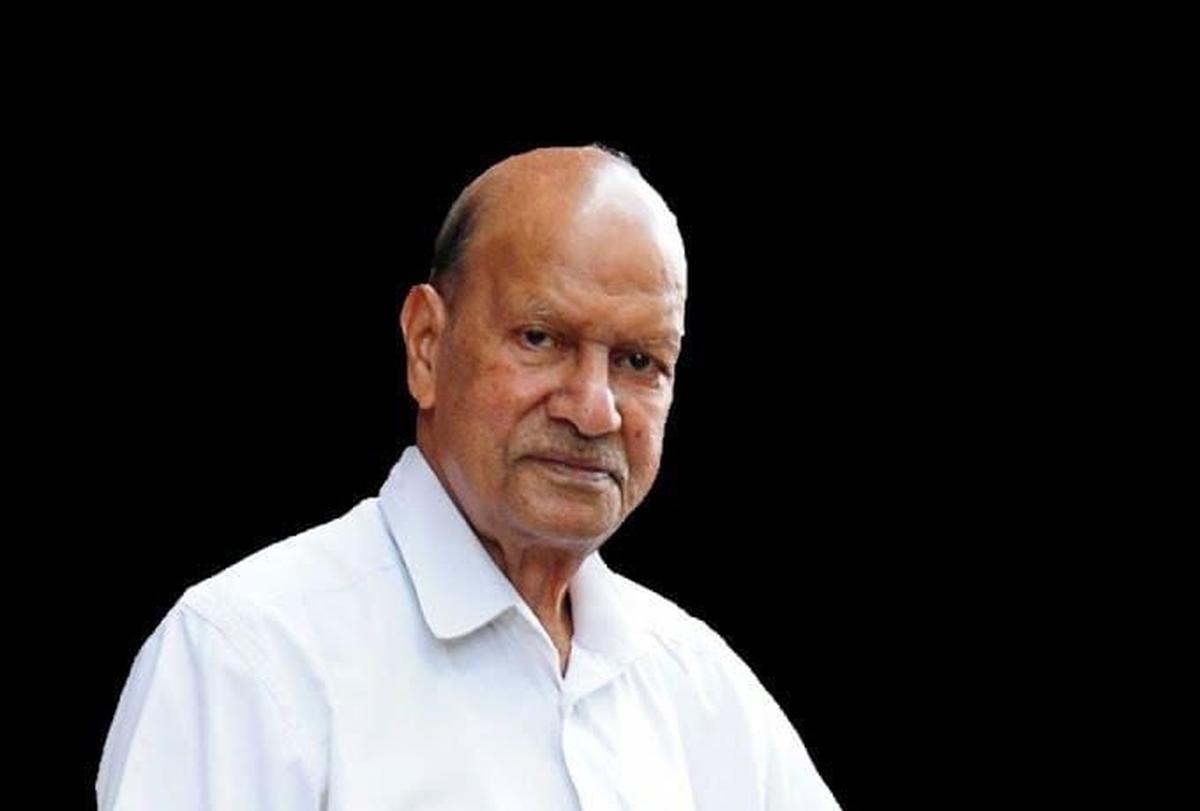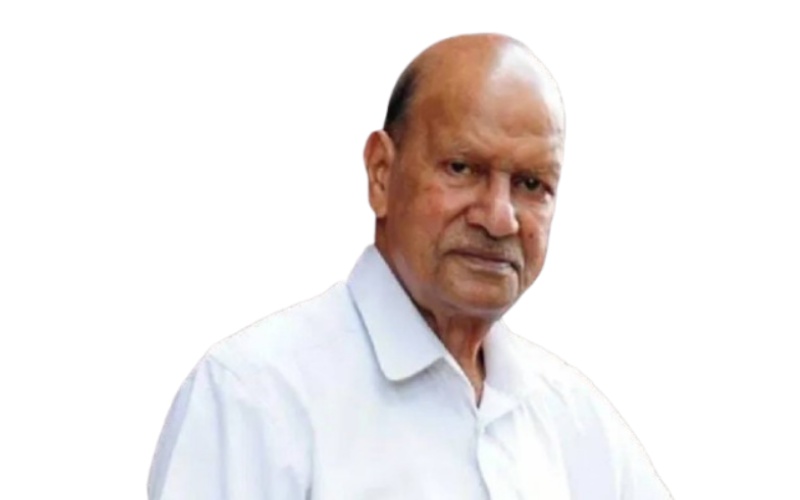Veteran Rashtriya Swayamsevak Sangh (RSS) leader and former Member of the Legislative Council (MLC) K. Narahari passed away on Tuesday, leaving behind a legacy deeply intertwined with Karnataka’s socio-political evolution. He was 87. Known for his unwavering ideological commitment and disciplined organizational work, Narahari played a pivotal role in shaping the RSS cadre in northern Karnataka. His political journey, marked by simplicity and conviction, earned him admiration across party lines. Senior leaders, including Chief Minister Siddaramaiah and BJP stalwarts, paid rich tributes, recalling his contribution to public life and moral leadership in politics.
Born in Dharwad, Narahari joined the RSS during his student days and quickly rose through the ranks as a dedicated pracharak. He was instrumental in strengthening the Sangh’s outreach in rural areas, emphasizing cultural education, self-reliance, and community service. Later, his transition into politics as an MLC reflected his belief in translating ideology into governance. As a legislator, he focused on rural development, education, and ethical administration. His speeches in the Council were noted for their depth and decorum, often highlighting the need for harmony between progress and tradition. Even after retirement, Narahari remained active in guiding young volunteers and mentoring future leaders.
In his final years, Narahari lived a life of quiet reflection, continuing to write and engage in social service. His demise has been described by associates as the end of an era for Karnataka’s nationalist movement. Funeral rites were performed with full honors, attended by leaders from across the political spectrum. For many, his life symbolizes the enduring values of discipline, humility, and service to society that formed the bedrock of his ideology.

A Legacy of Simplicity and Ideological Strength
K. Narahari was celebrated not only for his political discipline but also for his personal integrity. Colleagues recall how he maintained a frugal lifestyle, refused personal privileges, and remained deeply connected to grassroots workers. His commitment to ideological purity and public ethics served as a model for younger generations of politicians.
His influence extended beyond formal politics into education and cultural revival efforts. He helped establish schools promoting value-based education and championed Kannada language and literature, believing cultural identity was central to national progress.

Political observers note that K. Narahari’s life was a testament to the transformation of Karnataka’s right-wing politics from a grassroots movement into a mainstream force. His early years as an RSS pracharak coincided with a period of ideological consolidation, when nationalist thought was gradually finding its place in public discourse. Narahari’s emphasis on character building and civic duty helped shape the next generation of swayamsevaks who went on to take leadership roles across the State. He was known for maintaining harmony among diverse voices within the Sangh, fostering unity while respecting individual conviction.
During his tenure as an MLC, Narahari’s contributions were grounded in practicality rather than partisanship. He worked across political lines to push for reforms in rural governance, agricultural development, and educational access. His interventions in the Legislative Council were marked by meticulous preparation and a calm, reasoned tone, reflecting his commitment to dialogue over confrontation. Even opponents admired his courtesy and patience, describing him as a leader who elevated the quality of debate. His deep respect for democratic institutions was rooted in his belief that patriotism must coexist with inclusivity and respect for differing viewpoints.
Narahari’s close association with several nationalist thinkers shaped his intellectual outlook. He regularly organized study circles and youth workshops that blended cultural history with contemporary civic issues. These gatherings inspired many to view nation-building not merely as political activism but as a moral responsibility. His writings, often published in local journals, emphasized discipline, duty, and the preservation of India’s pluralistic identity. In every role he undertook, from teacher to organizer to lawmaker, his guiding principle remained the same — service before self.
Outside politics, Narahari’s deep interest in education made him a familiar figure among academic circles in Dharwad and Belagavi. He frequently visited schools to interact with students and encourage them to pursue both academic excellence and ethical living. His efforts led to the establishment of scholarship programs for rural students, many of whom credit him for helping them continue their studies. He believed education was the true foundation of national character and often said that knowledge without morality was meaningless. His humility and accessibility made him beloved among teachers and parents alike.
His work with cooperative movements in the 1980s and 1990s strengthened local self-sufficiency. Narahari helped organize rural training camps on agriculture, entrepreneurship, and resource management, empowering villagers to become economically independent. His vision was rooted in Gandhian simplicity and pragmatic development, promoting small-scale industries as engines of growth. These programs not only uplifted communities but also reinforced his image as a leader who understood both ideology and implementation. His initiatives prefigured modern sustainable development models now promoted by the government.
Leaders across the political spectrum paid heartfelt tributes after his passing. Prime Minister Narendra Modi expressed sorrow, acknowledging Narahari’s lifelong devotion to public service and moral clarity. Former Chief Ministers B.S. Yediyurappa and H.D. Kumaraswamy described him as a “bridge-builder” whose calm counsel prevented many political rifts. Even leaders from the Congress recalled his fairness and humanity, saying ideological differences never came in the way of personal respect. The broad consensus around his legacy underscored his rare ability to transcend party boundaries.
Among grassroots workers, Narahari’s death was felt deeply. For decades, he had personally guided hundreds of volunteers, teaching them the importance of punctuality, discipline, and empathy. His home in Dharwad was known as an open space where anyone could seek advice or comfort. Many remember him sitting cross-legged on a mat, listening more than he spoke, offering practical wisdom drawn from lived experience. Even in old age, he attended local shakhas and community events, walking with a stick but with the same attentiveness that had defined his younger years.
Historians place Narahari among the early generation of post-Independence leaders who linked ideology with social welfare. He believed nationalism was incomplete without compassion and saw moral rejuvenation as essential to political reform. His ability to balance traditional values with progressive thought made him relevant even in changing times. Younger politicians often turned to him for guidance on ethical dilemmas, describing his advice as rooted in both principle and pragmatism. His passing marks the gradual fading of a generation that placed moral integrity above ambition.
The RSS in Karnataka held condolence meetings across its branches, remembering Narahari as a mentor who shaped the organization’s humane image. Volunteers observed a day of silence, and many shared stories of his simplicity — how he often traveled by bus, carried his own meals, and lived without luxury. His life served as a reminder that leadership derives not from authority but from credibility earned through example. His colleagues say he embodied the ideal swayamsevak: humble, dedicated, and unshaken by recognition or criticism.
In the years following his legislative career, Narahari continued to write reflective essays on social ethics, rural progress, and Indian philosophy. These writings, compiled into a few volumes, are now being revisited for their relevance to contemporary governance. Scholars appreciate his ability to blend tradition with reason, arguing that his vision of politics as a moral pursuit remains crucial today. His last essay, written just months before his passing, spoke about the need for empathy in leadership — a fitting final message from a man who lived by that principle.
At the local level, several civic organizations have proposed renaming a government school or library in his honor. They believe such a gesture would preserve his memory for future generations and continue his legacy of public education. Plans are also underway to digitize his speeches and writings to make them accessible to students and researchers. His family, maintaining his humility, has requested that any memorial be simple and focused on service, not grandeur. Their response reflects the very values Narahari championed throughout his life.
Veteran journalists covering state politics recall Narahari’s interactions with the press as cordial and transparent. He was known to answer questions patiently, emphasizing truth and civility in public communication. Even during times of political turmoil, he advised restraint and discouraged sensationalism. Reporters often remarked that his clarity of thought made him one of the most respected voices in Karnataka’s political landscape. His absence, they say, will be deeply felt in a time when measured discourse is increasingly rare.
Among his lesser-known contributions was his involvement in disaster relief operations. Whether during droughts or floods, Narahari mobilized volunteers for immediate relief work, personally visiting affected areas. His leadership during the 2009 North Karnataka floods was particularly lauded, as he coordinated with local officials to ensure aid reached even remote villages. For him, service was not seasonal — it was a lifelong vow. His consistent involvement in such missions reinforced his image as a servant leader, grounded in empathy rather than power.
Family members describe Narahari as affectionate yet disciplined, balancing affection with guidance. Despite his demanding schedule, he made time for his grandchildren, teaching them prayers, stories from Indian history, and lessons in humility. Those close to him recall that he never imposed his views but inspired through action. His home reflected his ideals — modest, filled with books, and always open to guests. In a political culture often dominated by excess, his personal life stood as an example of quiet dignity and purpose.
Cultural organizations from Dharwad have also mourned his loss, remembering his efforts to preserve folk traditions and Kannada literature. Narahari believed that regional languages were vital carriers of national culture and supported young poets and dramatists. He attended literary conferences regularly, often speaking about the moral responsibility of writers in shaping society. His commitment to culture as an instrument of unity has left a mark on Karnataka’s intellectual community, ensuring that his influence extends beyond politics.
An Enduring Influence on Karnataka’s Political Landscape
Even in the later years of his life, Narahari’s advice was sought by both RSS and BJP leaders, who saw in him a bridge between tradition and modern politics. His ability to reconcile differing opinions within the cadre made him a respected elder statesman. He also played a crucial role in community outreach programs and disaster relief initiatives led by the RSS in Karnataka.
As tributes pour in, many remember him not just as a political figure, but as a mentor who inspired dedication and moral clarity. K. Narahari’s passing leaves behind a vacuum in Karnataka’s ideological and political circles — one that will be difficult to fill, but whose lessons in leadership and humility will continue to inspire generations to come.

Follow: Karnataka Government
Also read: Home | Channel 6 Network – Latest News, Breaking Updates: Politics, Business, Tech & More

